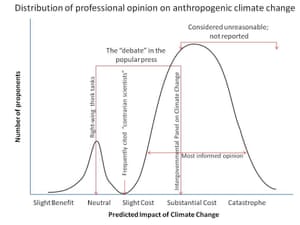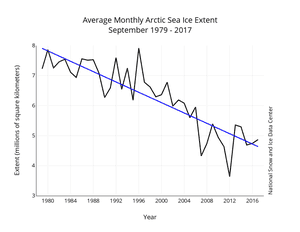Futures Forum: Climate change sceptics 'are losing their grip'
And there are climate change alarmists:
Climate Alarmists | Heartland Institute
News - Fake Climate Science and Scientists | Heartland Institute
Climate Alarmists Admit They Want to Dismantle Our Free-Enterprise System | The Heritage Foundation
The Sceptical Science website is debating these issues:
There are genuine climate alarmists, but they're not in the same league as deniers
Here's the original piece from last July's Guardian:
There are genuine climate alarmists, but they're not in the same league as deniers
Deniers have conservative media outlets and control the Republican Party; climate alarmists are largely ignored
Those who debunk climate change misinformation often face a dilemma. We’re flooded with such a constant deluge of climate myths, where should we focus our efforts? Climate misinformation is propagated via congressional climate hearings, conservative media outlets, denial blogs, and even from some genuine climate alarmists.
Specifically, there has recently been a debate as to whether Skeptical Science– a website with a database of climate myths and scientific debunkings, to which I’m a primary contributor – would be more useful and effective if it called out misinformation from ‘alarmists,’ and if it eliminated or revised its Climate Misinformers page.
There is some validity to these critiques, and in response, Skeptical Science is renaming the page ‘Climate misinformation by source.’ But the site is run entirely by a team of international volunteers, and as such, opportunity costsmust be considered. Time devoted to refuting alarmists is time not devoted to debunking the constant deluge of climate denial.
Unlike deniers, climate alarmists are not influential
Climate deniers are obviously incredibly influential. Despite their lack of supporting evidence or facts, not only do 28% of Americans continue to believe that global warming is natural and 14% that it’s not even happening, but deniers also dictate Republican Party policy. Republican policymakers constantly invite deniers to testify in congressional hearings, including many of those featured on the Skeptical Science misinformers page.
There is no symmetry on the other side of the aisle. In those same congressional hearings, Democratic Party policymakers invite mainstream climate scientists to testify. Their party policy is based on the consensus of 97% of the climate science community.
Ultimately, the issue boils down to a warped ‘Overton Window’ – the range of ideas tolerated in public discourse. In the real world, we have climate deniers on one extreme, alarmists on the other, and mainstream climate science in the middle. But the public discourse is warped – we instead have a heavy focus on climate denial among conservative media outlets and policymakers, a heavy focus on mainstream climate science among reputable media outlets and liberal policymakers, and the alarmists are largely ignored. Michael Tobis nicely diagrammed this in the climate Overton Window:
But there are some alarmists
That being said, there are a few reasonably well-known individuals who could be accurately described as climate alarmists. The most prominent is Guy McPherson, who decided in 2002 that climate change would likely drive humans to extinction by 2030. Sixteen years later, we’re now more than halfway to 2030 and the global human population has grown from 6.3 bn to 7.6 bn. It’s quite safe to say we won’t go extinct in the next few decades.
McPherson’s case basically boils down to arguing that feedbacks like large methane releases will soon kick in, causing a rapid spike in global warming that will lead to global extinctions. One of his primary pieces of supporting evidence is that Earth System Sensitivity – which describes how sensitive the climate is to the increased greenhouse effect over millennia – is higher than the shorter-term climate sensitivity.
That was essentially the gist of a recent study profiled here in the Guardian. Over millennia, global temperatures and sea level rise will continue to rise beyond what climate models predict will happen over the next couple of centuries. But these are slow feedbacks, and as such won’t kick in within the next few decades. Scott Johnson did a very deep dive into McPherson’s flawed arguments, for those who want to learn about them in greater detail.
As another example, Peter Wadhams predicted in 2012 that the Arctic would be ice-free in the summer by 2016. In fact, the summer of 2012 saw a dramatic decline in year-to-year Arctic sea ice extent (down to 3.6 million square km), which Wadhams believed would become the norm. That hasn’t yet been the case – there were 4.7 million square km of Arctic sea ice in the summer of 2016.
It’s worth noting that Wadhams gets most of the climate science right. There is absolutely a long-term decline in Arctic sea ice, which is in the midst of what many have described as a ‘death spiral.’ And Arctic sea ice is thinning rapidly. The Arctic will eventually be ice-free in the summer, but not within the next few years. According to Met Office Chief Scientist Julia Slingo, 2025–2030 would be the earliest date for an ice-free Arctic summer, and 2040–2060 is more likely. Wadhams also believes that there may soon be a large methane release from the Arctic, but a review of the relevant research suggests this isn’t a near-term concern:
There is no evidence that methane will run out of control and initiate any sudden, catastrophic effects. There’s certainly no runaway greenhouse. Instead, chronic methane releases will supplement the primary role of CO2.
Climate denial is a much bigger problem
Wadhams has received some mainstream media attention, including in the Guardian, but his more alarmist warnings are largely ignored. There certainly isn’t a powerful political party basing its climate policies on his inaccurate predictions.
And that’s really the key point. While there are people on ‘both sides’ who spread misinformation, there are far more on the denier than the alarmist side, who are generally far wronger, and the deniers also have a far greater influence over policymakers.
There’s certainly nothing wrong with debunking overly alarmist claims – in fact, it’s a worthwhile endeavor, and some groups like Climate Feedback do just that. But debunking uninfluential alarmism comes at a cost. It diverts resources away from addressing the never-ending flood of misinformation coming from climate deniers who currently control the climate policy platform of the party in charge of one of the most powerful countries on Earth.
There are genuine climate alarmists, but they're not in the same league as deniers | Dana Nuccitelli | Environment | The Guardian
.
.
.





No comments:
Post a Comment